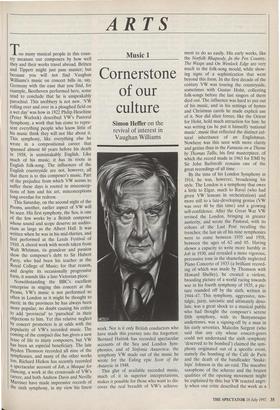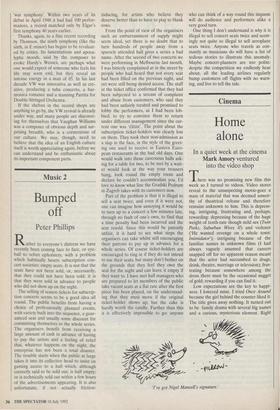ARTS
Music 1
Cornerstone of our culture
Simon Heifer on the revival of interest in Vaughan Williams
Too many musical people in this coun- try measure our composers by how well they and their works travel abroad. Britten and Tippett might just pass muster; but because you will not find Vaughan Williams's music on concert bills in, say, Germany with the ease that you find, for example, Beethoven performed here, some tend to conclude that he is unspeakably parochial. This snobbery is not new. 'VW rolling over and over in a ploughed field on a wet day' was how in 1922 Philip Hesetrine (Peter Warlock) described VW's Pastoral Symphony, a work that has come to repre- sent everything people who know little of his music think they will not like about it. This symphony, like everything else he wrote in a compositional career that spanned almost 60 years before his death in 1958, is unmistakably English. Like much of his music, it has its roots in English folk-song. The influences of the English countryside are not, however, all that there is to this composer's music. Part of the prejudice from which VW seems to suffer these days is rooted in misconcep- tions of him and his art, misconceptions long overdue for redress.
This Saturday, on the second night of the Proms, another, earlier aspect of VW will be seen. His first symphony, the Sea, is one of the few works by a British composer Whose sound and scope deserve an audito- rium as large as the Albert Hall. It was written when he was in his mid-thirties, and first performed at the Leeds Festival of 1910. A choral work with words taken from Walt Whitman, its grandeur and passion Show the composer's debt to Sir Hubert Parry, who had been his teacher at the Royal College of Music; for that reason, and despite its occasionally progressive form, it sounds like a late-Victorian piece.
Notwithstanding the BBC's excellent enterprise in staging this concert at the Proms, VW's music is not performed so often in London as it might be thought to merit: in the provinces he has always been more popular, no doubt causing his critics to add 'provincial' to 'parochial' in their Objections to him. Yet this relative neglect by concert promoters is at odds with the Popularity of VW's recorded music. The Coming of the compact disc has given a new lease of life to many composers, but VW has been an especial beneficiary. The late Bryden Thomson recorded all nine of the Symphonies, and many of the other works too. Richard Hickox has recently recorded a spectacular account of Job, a Masque for Dancing, a work at the crossroads of VW's career, and both Andrew Davis and Neville Marriner have made impressive records of the sixth symphony, in my view his finest work. Nor is it only British conductors who have made this journey into the forgotten: Bernard Haitink has recorded spectacular accounts of the Sea and London Sym- phonies, and of Sinfonia Antarctica, the symphony VW made out of the music he wrote for the Ealing epic Scott of the Antarctic in 1948.
This glut of available recorded music, much of it in superior interpretations, makes it possible for those who want to dis- cover the real breadth of VW's achieve-
ment to do so easily. His early works, like the Norfolk Rhapsody, _In the Fen Country, The Wasps and On Wenlock Edge are very much in the folk-song mould, while show- ing signs of a sophistication that went beyond this form. In the first decade of the century VW was touring the countryside, sometimes with Gustav Hoist, collecting folk-songs before the last singers of them died out. The influence was hard to put out of his music, and in his settings of hymns and Christmas carols he made explicit use of it. Nor did alien forces, like the Orient for Hoist, hold much attraction for him: he was writing (as he put it himself) 'national music', music that reflected the distinct cul- tural inheritance of an Englishman. Nowhere was this seen with more clarity and genius than in the Fantasia on a Theme by Thomas Tallis, his first masterpiece, of which the record made in 1963 for EMI by Sir John Barbirolli remains one of the great recordings of all time.
By the time of his London Symphony in 1914, he was, however, broadening his style. The London is a symphony that owes a little to Elgar, much to Ravel (who had given VW lessons in orchestration) and more still to a late-developing genius (VW was over 40 by this time) and a growing self-confidence. After the Great War VW revised the London, bringing in greater austerity, and wrote the Pastoral, with its echoes of the Last Post recalling the trenches; the last six of his nine symphonies were to come between 1935 and 1958, between the ages of 62 and 85. Having shown a capacity to write more harshly in Job in 1930, and revealed a more vigorous, percussive tone in the shamefully neglected Piano Concerto of 1933 (a brilliant record- ing of which was made by Thomson with Howard Shelley), he created a violent, brooding picture of a world racing towards war in his fourth symphony of 1935, a pic- ture rounded off by the sixth, written in 1944-47. This symphony, aggressive, nos- talgic, jazzy, sarcastic and ultimately deso- late, was a great shock to a musical public who had thought the composer's serene fifth symphony, with its Bunyanesque undertones, was a signing-off by a man in his early seventies. Malcolm Sargent (who said that any city whose concert-goers could not understand the sixth symphony 'deserved to be bombed') claimed the sym- phony originated out of a specific event, namely the bombing of the Café de Paris and the death of the bandleader 'Snake- hips' Johnson in the air-raid. The macabre saxophone of the scherzo and the brazen qualities of the opening movement might be explained by this; but VW reacted angri- ly when one critic described the work as a
'war symphony'. Within two years of its debut in April 1948 it had had 100 perfor- mances, a record matched only by Elgar's first symphony 40 years earlier.
Thanks, again, to a fine recent recording by Thomson, the ninth symphony (like the sixth, in E minor) has begun to be revaluat- ed by critics. Its lamentations and apoca- lyptic moods, said by the composer to evoke Hardy's Wessex, are perhaps what one would expect of someone who feels his life may soon end, but they reveal an intense energy in a man of 85. In his last decade VW was innovative as well as cre- ative, producing a tuba concerto, a har- monica romance and a stunning Partita for Double-Stringed Orchestra.
If the shelves in the record shops are anything to go by, the VW revival is already under way, and many people are discover- ing for themselves that Vaughan Williams was a composer of obvious depth and sur- prising breadth, who is a cornerstone of our culture. We may, though, need to believe that the idea of an English culture itself is worth appreciating again, before we can understand and be enthusiastic about its important component parts.



















































 Previous page
Previous page